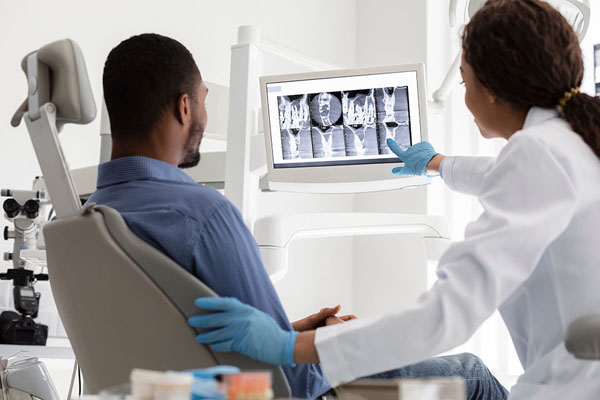Know When to Seek Treatment for Jaw Pain
The temporomandibular joint (TMJ) connects the jawbone to the skull. Any damage to this joint can cause a range of symptoms, collectively known as TMJ disorders (TMD). Fortunately, you don’t have to live with jaw pain for the rest of your life.
If you’re experiencing any of the symptoms mentioned below, you may be suffering from temporomandibular joint disorder. Contact our Sacramento dentist today to schedule a TMJ evaluation and we’ll recommend the best treatment for you.
Symptoms of TMJ Disorders
Jaw Pain and Tenderness
One of the most common symptoms of TMJ disorder is pain and tenderness in the jaw joint area. This pain can be mild or severe and may worsen when you chew or open your mouth. Some people also experience a dull ache or pressure in the jaw, and the pain may radiate to other facial muscles and parts of the neck or shoulders.
Clicking or Popping Sounds
If you hear clicking or popping sounds when you open or close your mouth, it may be a sign of TMJ disorder. The sound is caused by the disc that cushions the joint from moving out of place. While this symptom isn’t always painful, it can be a cause for concern if it’s accompanied by other TMJ disorder symptoms.
Limited Jaw Movement
If you have difficulty opening or closing your mouth, it could be a sign of TMD. This symptom can make it difficult to eat, speak, or even yawn. In severe cases, you may not be able to open your mouth more than a few millimeters.
Locking of the Jaw
In more severe cases, the jaw may become locked in an open or closed position. A locked jaw can be temporary or prolonged, and it often requires medical intervention to release the jaw.
Headaches
TMJ disorder can cause headaches, particularly in the temples or behind the eyes. These headaches may be constant or intermittent and may be accompanied by other symptoms such as dizziness or ringing in the ears.
Toothaches
TMJ-related pain can sometimes be mistaken for dental issues, leading to toothaches even when there’s no dental problem. This occurs because the nerves that serve the jaw and teeth are interconnected.
Tinnitus
Some individuals with TMJ disorders may experience tinnitus, which is the perception of ringing, buzzing, or hissing sounds in the ears. This is due to the proximity of the ear structures to the jaw joints
Facial, Neck, and Shoulder Pain
Pain in the face, especially around the cheeks, temples, or below the eyes, is a common symptom of TMJ disorders. This pain can be dull, aching pain, or sharp. Pain from the jaw joint can also radiate to the neck and shoulders, leading to muscle tension and discomfort in these areas.
Teeth Grinding (Bruxism)
Bruxism, or teeth grinding, is a common symptom of TMJ disorder. Grinding your upper and lower teeth together can cause further damage to the jaw joint and exacerbate other symptoms, such as jaw pain and headaches. Some people may grind their teeth during sleep and may not be aware of the problem until they experience TMD symptoms.
Where Are TMJ Symptoms Felt?
Temporomandibular joint symptoms are typically felt in the jaw joint area but can also radiate to other parts of the face, neck, and shoulders.
Areas where TMJ symptoms occur include:
- Jaw Joint: Pain, tenderness, clicking or popping sounds, limited jaw movement
- Ears: Often mistaken for an ear infection, accompanied by a popping or clicking sound in the ears
- Head: Headaches, ear pain, tinnitus (ringing in the ears)
- Mouth: Difficulty chewing or speaking
- Neck and Shoulders: Tension, pain, stiffness
Do Different TMJ Disorders Cause Different Symptoms?
There are several types of temporomandibular joint disorders, and the symptoms may vary depending on the specific condition. The most common types of TMJ disorders include:
- Myofascial Pain Disorder: Pain and discomfort in the muscles that control jaw movement
- Degenerative Joint Disease: Arthritis or other conditions that cause damage to the joint, resulting in pain and limited movement
- TMJ Ankylosis: Difficulty opening the mouth, pain or discomfort in the jaw joint, headaches, difficulty chewing or speaking, and facial asymmetry
- Internal Joint Derangement: Clicking or popping sounds when opening or closing the mouth, pain or tenderness in the jaw joint, limited jaw movement, headaches, and ear pain
Frequently Asked Questions
How do I know if my jaw pain is due to TMD?
If you’re experiencing pain or discomfort in your jaw joint or jaw muscles, as well as clicking or popping sounds when you open and close your mouth, you may have TMD. Other symptoms may include difficulty chewing or biting, aching or pain in the face or neck, and swelling on one or both sides of the face. If you’re experiencing these symptoms, seek evaluation and treatment from a doctor.
Can TMD affect my ability to eat or speak?
Yes, TMD can make it difficult to eat or speak, particularly if you’re experiencing pain, stiffness, or limited range of motion in the jaw. Other symptoms that may affect your ability to eat or speak include clicking or popping sounds when you open and close your mouth. You may also experience the feeling of your jaw getting stuck or locked in place. If you’re experiencing difficulty eating or speaking, seek evaluation and treatment from your dentist.
What can be mistaken for TMJ?
Chronic cluster, migraine, or tension headaches can sometimes be misinterpreted as symptoms of TMJ disorder, primarily because TMJ disorder itself can trigger similar headache patterns. Additionally, persistent sinus pain and sinus infections may generate discomfort around the temples, mimicking the sensations associated with TMJ disorder.
Don’t Let Jaw Pain Rule Your Life — Know When to Seek Treatment
If you’re experiencing any signs or symptoms of TMD, schedule an appointment with our Sacramento dentist today. Early intervention can help prevent long-term complications and improve your quality of life. Our dentist may recommend treatments such as physical therapy, prescription medications, or surgical options depending on your case.
Call our dental office at (916) 929-9222 to schedule a consultation.


